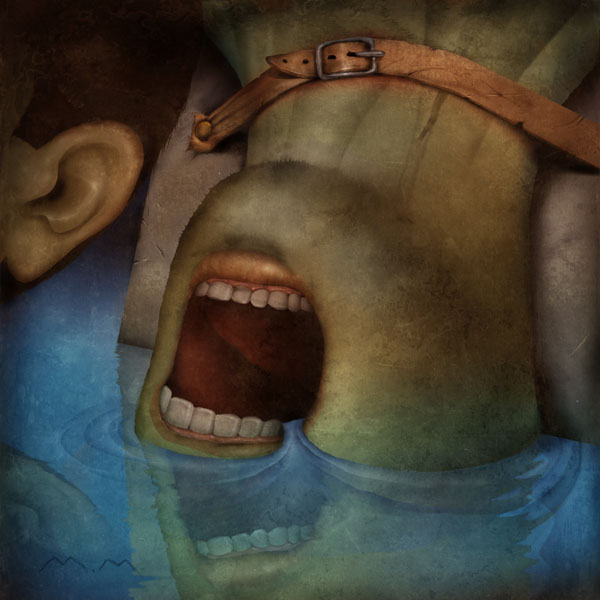Coercion and Military Law
Khalid Shaikh Mohammed, the architect of the 9/11 attacks, attempted to plead guilty on Monday. But civil libertarians wonder if the plea is compromised by the fact of his torture and the dubious constitutionality of the military tribunals hearing the cases.
Jul 31, 202056.1K Shares1.4M Views
Illustration by: Matt Mahurin
Khalid Shaikh Mohammed, the architect of the 9/11 attacks whom the U.S. tortured, attempted to plead guilty on Monday four co-defendants to their roles in the 2001 conspiracy that killed almost 3,000 Americans. Civil libertarians wondered whether his proferred plea would be compromised by the fact of his torture and the dubious constitutionality of the military tribunals hearing the cases.
The senior counterterrorism adviser for Human Rights Watch, Jennifer Daskal, said in a statement issued by the organization that the attempted pleas by Mohammed and the other co-defendants should not be accepted before an investigation. “In light of the men’s severe mistreatment and torture, the judge should require a full and thorough factual inquiry to determine whether or not these pleas are voluntary,” said Daskal, who is at Guantanamo Bay observing the proceedings.
Illustration by: Matt Mahurin
According to the 2006 Military Commissions Act, which governs the tribunals, evidence obtained through coercive means is inadmissible. “A statement obtained by use of torture shall not be admissible in a military commission,” states Sec. 948r, subsection B. Subsequent sections of the act, however, permits a judge to determine the admissibility of certain evidence “in which the degree of coercion is disputed,” particularly in the case of evidence obtained before passage of a 2005 law meant to safeguard the human rights of detainees.
Stacy Sullivan, another counterterrorism adviser with Human Rights Watch, said the Military Commissions Act is unclear on what happens if a guilty plea is allegedly coerced from a detainee. “It’s not clear whether a judge can accept the plea or if there has to be a jury” empaneled to accept it, she said. If the act requires the empanelment of a jury for a pretrial hearing, it would create a new complication to a process fraught with difficulty since its inception.
U.S. Army Col. Steven Hendley, the presiding judge in the case, said he would hold a separate hearing to determine whether he can, in fact, accept the pleas, Sullivan said.
Pakistani forces captured Mohammed, one of Al Qaeda’s most important operatives, in March 2003 in Rawalpindi. The CIA took custody of him shortly thereafter and placed him in an undisclosed location to interrogate him outside U.S. law and without access to the International Committee of the Red Cross, which monitors prisoners of war and detainees worldwide. In testimony to the Senate intelligence committee in February, Michael Hayden, director of the CIA, confirmedthat CIA interrogators waterboarded Mohammed, meaning they forced water into his nostrils and mouth to restrict his breathing in an attempt to coerce Mohammed into answering their questions. Before the Sept. 11 attacks, the U.S. considered the interrogation method to be uncontroversially felonious.
Mohammed was moved to Guantanamo Bay in Sept. 2006. It is unknown what sort of treatment he has received from interrogators or jailers after the passage of the 2005 Detainee Treatment Act.
The pleas appear to be the result of frustration over the fairness of the commissions process. “All of you are paid by the U.S. government. I’m not trusting any American,” Mohammed told the tribunal, according to The New York Times. McClatchy reportedthat the five detainees — Mohammed, his nephew Ammar al Baluchi, his deputy Ramzi bin al-Shibh, Al Qaeda trainer Walid bin Attash and Saudi detainee Mustafa al-Hawsawi — crafted their joint pleading during a rare meeting Nov. 4 that was sanctioned by Guantanamo Bay officials. Later Monday, Mohammed, al-Baluchi and bin Attash abruptly announced they would postpone entering their pleas until the competency of bin al-Shibh and al-Hawsawi to plead guilty — something Hendley questioned that morning — could be determined.
Sullivan said that basic circumstances of the military commissions give reason to suspect that the confessions are coerced — coerced either by the administration or by Mohammed. “These guys have been subjected to seven years of detention, much in secret CIA detention facilities,” Sullivan said. “We know they’ve been seriously abused and tortured. If these guys were before a real judicial process, not one that’s made up and fundamentally unfair, there would be a full hearing into what kind torture and abuse went on and whether [the pleadings] are voluntary.” She pointed out that only after Mohammed announced his refusal to cooperate with the commissions did his four co-defendants refuse their defense counsel, raising the specter of whether Mohammed coerced their pleadings.
Anthony Romero, executive director of the ACLU, blasted the commissions from Guantanamo Bay, where he is observing the tribunals. “No one should be surprised that a system that allows for serial torture and abuse and holds detainees for years without charging them or granting them access to attorneys has led the defendants to capitulate and seek to plead guilty,” Romero said in a statement released by the ACLU. “Anyone who believes that this is a victory for American justice is sadly mistaken. History will show that any guilty pleas in these proceedings were the result of an inhumane, unjust process designed to achieve a foregone conclusion.”
It is unclear why Mohammed and his accomplices pleaded guilty. The U.S. has signaled its attention to seek the death penalty for all five defendants in the 9/11 conspiracy case, and so one explanation is that they are daring the U.S. to put them to death, a gambit designed to grant them the exalted status of “martyr” in some extremist circles. Another is that some measure of coercion compelled the pleadings.
Aitan Goelman, a former federal prosecutor for the 1995 Oklahoma City bombings, said he was unsurprised by the confessions given the detainees’ evident pride at having pulled off the attacks. “It’s not really an adversarial process if both sides are intent on proving the same thing,” Goelman said, adding that despite the “unprecedented nature” of the military commissions it was unclear to him how the pleadings could have been coerced.
The commissions have been fraught with controversy from the beginning. Several military lawyers have quit or sought reassignmentfrom the commissions out of concerns over their basic fairness. “The military commissions are fundamentally at odds with American ideals of fairness, due process, the rule of law and justice,” said U.S. Air Force Reserve Maj. J.D. Frakt, a legal defense counsel at Guantanamo. He made his remarks in a videoreleased Monday by the ACLU to pressure President-elect Barack Obama to keep his stated promise of closing Guantanamo Bay.
Nor was it clear that the confessions represented a moment of closure for families of the victims of 9/11. Reached on Monday afternoon, Kristen Breitweiser, whose husband Ronald died in the World Trade Center, said she had not heard of the pleadings and wanted to know whether the administration gave Mohammed anything in return for his admission of guilt. She did, however, say that she hoped any information about the attacks that remains classified pending Mohammed’s trial “would be swiftly released.”
Sullivan blasted the commissions as inadequate to heal the U.S.’ psychic wounds from 9/11. “When you have a confession in a process that has lost all its integrity [and] that no one believes in, the confession doesn’t have any meaning,” she said. “If we had a guilty plea in a judicial process that was real, then we’d be welcoming the guilty plea. But before a sham, that’s not very meaningful.”

Paula M. Graham
Reviewer
Latest Articles
Popular Articles

